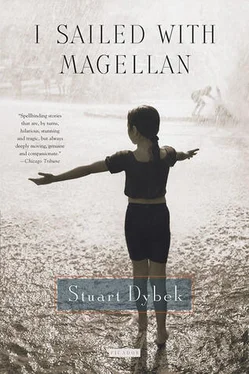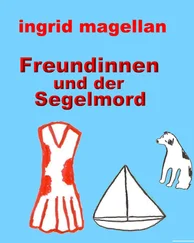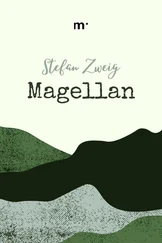In his sober interludes back then, Lefty tried, mostly unsuccessfully, to teach me to play the saxophone. After he died, besides his English topcoat, I inherited his tarnished Martin tenor sax. He’d owned an alto, too, but they couldn’t find it or the metal clarinet, and figured he must have pawned them, though the pawn tickets never surfaced amid his mess of papers.
He was the only guy I knew who patronized pawnshops. A few times he took me pawnshopping with him. Once he bought a pair of teardrop-shaped green and violet earrings.
“Who are they for?” I asked.
“For good dreams,” Uncle Lefty said. “Touch them to your eyelids before you go to sleep and no nightmares.”
“Are those emeralds?” I wanted to know.
“Peridots from Africa and amethysts from the Amazon,” the pawnbroker answered. He had unfolded a black velvet cloth on the counter, arranged the earrings on it, and was squinting at them through a jeweler’s loupe.
“If you look up my butt with that maybe you’ll discover the Hope diamond, too,” Lefty told him.
The pawnbroker didn’t seem offended, and I listened as they dickered back and forth until Lefty got him down to the price he wanted.
“I’m letting you steal from the mouths of my children,” the pawnbroker complained.
“Yeah, thanks,” Lefty said. “I’ll never forget you for that.”
As long as Lefty was dealing, I tried to talk him into buying something for me: a switchblade with a bone handle from a menacing display of knives and bayonets. Instead, he bought me a harmonica — a mouth harp, he called it.
“Perry, you take care of this,” Lefty told me, “and it will be a better friend to you than a goddamn blade.”
After I rinsed it out under the hot-water faucet about a hundred times in order to kill the germs of whatever degenerate had pawned it, I found that I actually had a knack for playing it that I lacked for a real horn.
Sometimes we went to Sportsman’s Park, as we had when I was little. Lefty would stake me so that I could bet on the sulkies. Stuffed in the inside pocket of his English topcoat, I found a roll of seventy-two dollars, mostly in the crisp two-dollar bills bearing Jefferson’s picture that I saw only at the track. I hadn’t mentioned finding the roll to anyone. Besides the money there were stubs of old racing tickets on which Lefty had tried to hit trifectas, the kind of bet he’d always taught me was for suckers.
As his drinking got heavier, I saw less of him. He was in and out of VA hospitals, though for what specific ailment no one seemed to know. He went out to California and returned sporting an eighth note tattooed in blue on his shoulder and a Vandyke beard that gave him a beatnik look.
The first time he was committed was after he fell out of the bleachers at Wrigley Field while trying to welcome Willie Mays to Chicago by handing down a Hamm’s beer. He’d galloped like a broken-field runner across the outfield grass, fighting off the ushers and cops who’d rushed to cart him out of the ballpark, and was sent to a psychiatric hospital on the far Northwest Side.
Each time he was committed my mother and I took a two-hour ride by El and bus and visited him. The hospital, which Lefty insisted we refer to as the Booby Hatch, was surrounded by a high, spiked iron fence painted a fir-tree green as if it were a natural feature of the wide expanse of lawn. Lefty referred to himself as a POD, Prisoner of Doctors, and I remember thinking that he’d been a POW in Korea, dreaming of escape and all the things he would do if he ever made it back to the States, little things like going to a ball game or buying himself a warm winter coat, and now he was home and imprisoned again.
The first few times he escaped, the hospital called my mother and we waited thinking that Lefty might show up at our house, but he never did. He’d disappear for weeks at a time and refuse to say where he’d been. My mother had a theory that Lefty had a girlfriend somewhere in the city, but the few times she hinted around to Lefty about it he just gazed silently at her with those hooded eyes.
His last escape was during a mild spell when December felt deceptively like April, misty and wet. They found his body on the morning after the night that it turned bitter cold again. Wearing the light sport coat that he’d escaped in, Lefty had tried to climb back into the Booby Hatch during the night over the locked front gates, and, blind drunk, had apparently fallen from the top of the gate and landed facedown in a puddle. The autopsy determined he’d drowned in three inches of muddy water. By morning the puddle had frozen around him, and they had to chip his body free from the ice. If he had to die in such a way, I wished that at least he had been climbing out instead of back inside.
I thought of the woman in the bronze wig, standing at the back of the church. Perhaps she had been Lefty’s secret girlfriend, maybe a woman he had met at the track or at some bar where he’d gone to listen to music, or a waitress on whom Lefty had used his I’ll-never-forget-you-for-that line. But the woman, wearing her sunglasses as if they were a sign of mourning, had looked too regal for a waitress. There was a fiery blush of rouge war-painted along the bronze of her high cheekbones. I tried to recall if she was wearing earrings, tried to imagine how those earrings that Lefty had bought might look on her. They’d have matched her oval eyes. Maybe it was her place where Lefty hid out during his escapes; maybe she was what kept him escaping. It hadn’t occurred to me before that Lefty needed something to escape to as well as from , and when I realized that, I wanted to see her again, to see her from Lefty’s point of view. I wanted to know what happened, why he hadn’t stayed with her that night when it turned cold, what drove him back to the Booby Hatch, though even in my fantasy of tracking her down, I knew we’d never have that conversation.
The cold had cleared my head. I wasn’t feeling sick any longer. In fact, I was starving. I almost turned back; then, walking down Adams, I passed Berghoff’s, a restaurant with an annexed stand-up bar that Lefty used to talk about. It was one of his favorite hangouts for celebrating when he hit it big at the track, a state of affluence he called “being in the peanuts and caramel.” Standing at the polished oak bar, he’d eat cold hard-boiled eggs, and Thuringer sandwiches on rye spread with brown mustard and horseradish, and wash them down with steins of Berghoff’s private-label dark beer. Probably he’d stood at the bar wearing the very topcoat that I was wearing now. Instead of heading back to St. Peter’s, I stepped into Berghoff’s.
Three bartenders were working the long bar, where businessmen, some still in their topcoats and scarves, stood packed together eating sandwiches and plates of hash and quaffing foamy steins. A line of men, shaking off the cold, waited for sandwiches from a server dressed in chef’s white, who expertly wielded a carving knife against the grain of mountainous roasts.
I noticed a Tribune left behind at one of the high, wooden tables along the wall where men stood as an alternative to crowding at the bar. I picked up the newspaper, which was folded to the market report, and wished I was smoking a cigar. No, I thought, that would be overdoing it. Instead, I snuck the butt of a half-smoked filter cigarette from an ashtray and struck a light from a handy Berghoff matchbook. I raised my topcoat collar up around my face, wedged in at the bar, and assumed the nonchalant pose of a man on a late lunch immersed in the financial section. My heart had begun to race. I was counting on the suit and Lefty’s topcoat to help me pass for legal drinking age; after all, there was no telling how many drinks that topcoat had been served in here.
Читать дальше












